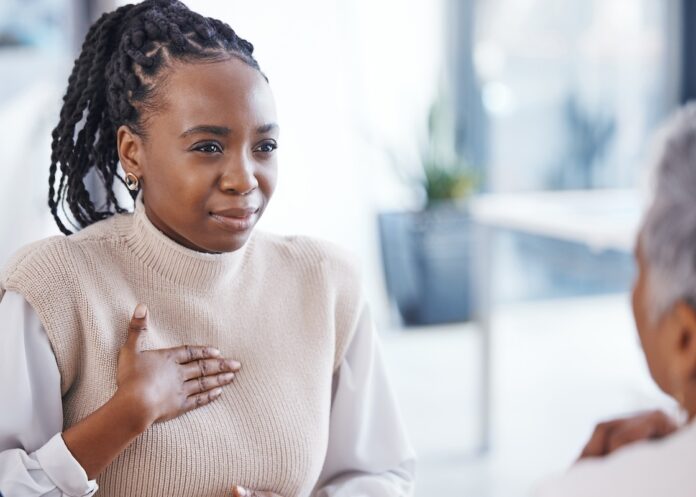Demeshia Montgomery knew her way around discomfort; after a lifetime of dealing with scleroderma, she was familiar with her body being triggered. But when chronic obstructive pulmonary disease (COPD) symptoms showed up in her life, she struggled with new challenges because they were not obvious right away.
She was out of breath but did not seek medical attention immediately. “I couldn’t breathe in my home, so I would go outside because I could breathe better outside. So, I ended up sleeping outside,” she said. “It just kept getting worse, and I was struggling for air,” she continued. “I knew something major was wrong, but my husband was really the driving force to send me to the hospital.”
Montgomery’s trip to urgent care was not fruitful. “They gave me some cough syrup. I don’t think they were even looking for this disease.” After a recent trip, she initially thought she had picked up a persistent cold or COVID. “I went from Ohio to New York, and I’m thinking, oh my goodness. Okay, I caught COVID.” The friend she’d traveled with was also suffering, so it made sense at the time until it didn’t.
“Chronic obstructive pulmonary disease (COPD), which includes chronic bronchitis and/or emphysema, is a progressive, debilitating respiratory condition and currently the third leading cause of death in the United States,” according to the American Thoracic Society. Although COPD had claimed the life of Montgomery’s father, she still had to go through her journey learning more about her symptoms, treatment, and management of the disease after finally obtaining a diagnosis. The COPD Foundation reports that “A person may have chronic obstructive pulmonary disease (COPD) but not notice symptoms until it is in the moderate stage.”
“Acute exacerbations of chronic obstructive pulmonary disease (AECOPD) describe the phenomenon of sudden worsening in airway function and respiratory symptoms in patients with COPD,” per the American Thoracic Society.
According to the American Journal of Respiratory and Critical Care Medicine, there is not just a higher occurrence of COPD in Black patients, but there are worse outcomes. They found that “Historically, the prevalence of COPD has been higher for white than for Black individuals, but recent studies suggest that Black individuals may suffer worse COPD morbidity” in a study published in 2021.
Montgomery was hospitalized because of the intense effects of COPD, impacting her health. She saw her primary care doctor, who referred her to a pulmonologist who issued a diagnosis. No physical or digital resources were issued to her. There were no inquiries about her mental health or recommendations for support groups given during her encounters with any of her doctors. According to the National Heart Lung and Blood Institute, “Because COPD is a progressive disease, its symptoms often develop slowly but worsen over time.”
“There’s a huge gap between being diagnosed and getting resources. In most cases, you must get the resources on your own, and if you’re just not that kind of person, then you live with no resources, and then you don’t know what’s going to happen to you,” said Montgomery. “I’d like to see that change.”
What Should You Do If You Experience Symptoms That Overlap With COPD?
- Consider Your Risks
The COPD Foundation recommends testing for anything with “long-term exposure to air pollution (including smoke, dust, fumes, and chemicals),” “Chronic coughing with or without sputum,” “Wheezing,” and “Shortness of breath.” They also strongly suggest being evaluated if you find yourself with an “inability to keep up with people of your own age.”
- Seek Medical Attention Immediately
Do not wait until you are out of breath until the fourth or fifth night to take your body seriously. If something feels off, go to the doctor right away.
- Communicate All of Your Symptoms
Do not downplay your symptoms. Don’t try to tough it out or self-medicate. Tell your healthcare practitioner exactly what you are going through and how it impacts your life. If they won’t listen, get a second opinion; if it takes a third or a fourth, get those. Uncomfortable pushing back? Bring someone with you to advocate for your needs and ask direct questions. If you suspect you have COPD but are diagnosed with something else, ask more questions. “Many adults with COPD are incorrectly diagnosed with asthma,” per the COPD Foundation.
- Seek Community
COPD will change your life in tangible ways. Joining a community will expose you to experiences and stories that will widen your resources.
“What’s been troubling for me is that I live in an underserved community,” said Montgomery. She donates her time and energy to bringing patients together.
“I have a support group at our doctor’s office, and I’ve been running into a lot of people that have COPD too, and they don’t know anything about the foundation, and they don’t know anything about any resources.”






